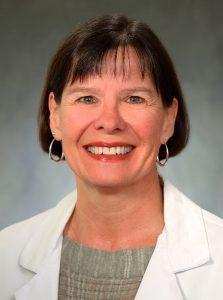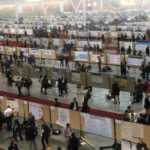ACR Convergence 2021 is right around the corner, and it’s going to be even bigger and better this year. The Annual Meeting Planning Committee (AMPC), ACR staff and volunteers learned a lot about virtual conferences in 2020 and have built on that experience to offer an interactive, educational and exciting event that will take place Nov. 1–10. This year’s program has “so much wonderful content,” says AMPC Chair Sharon Kolasinski, MD, professor of clinical medicine in the Division of Rheumatology at Penn Musculoskeletal Center, Perelman School of Medicine, University of Pennsylvania, Philadelphia. Planning ACR Convergence 2021 is “an extraordinary undertaking that is just joyful,” she says, citing the collaboration and excitement that go into bringing “the world’s best rheumatology meeting to fruition.”
The meeting kicks off Nov. 1 with early access to the virtual meeting platform, followed by advance programming Nov. 3–5, which includes the all-new Global Rheumatology Summit, Basic and Clinical Research Conference and Radiology Bootcamp. ACR Convergence 2021 scientific programming and special events will be Nov. 5–9, a dedicated Business of Rheumatology and Rehab program will be Nov. 8–9 and the ACR Review Course is on Nov. 10.
Planning a Premier Event
Planning for the meeting begins about a year ahead of time when the committee is selected. Dr. Kolasinski, currently serving the first of a three-year term as chair, has been leading the charge, guiding the committee in selecting the most innovative, relevant and practical content. “We really benefit from the years of experience of all of the people at the ACR, all the processes that are in place and the experience of the committee members, many of whom have served in other capacities on ACR committees and bring their knowledge and expertise, not just of subject matter, but to how to get things done,” Dr. Kolasinski says. (See box below, right, for a few key AMPC members.)
Some new offerings this year include Community Hubs, situated on the main program so they’re easy to find; new communities for educators, the business of rheumatology, aging, early career and ultrasound; and American Board of Pediatrics maintenance of certification (MOC) points. Also new is the combined basic and clinical research conference, which will address rheumatology complications of emerging viral infections/SARS-CoV-2.
Scientific Program
A significant portion of the planning effort is put into the scientific program. Session topics are based on feedback from 2020 attendees, ideas from ACR members, input from committee members and suggestions from other ACR committees (e.g., Government Affairs, Workforce & Training, Education). AMPC members independently rank the numerous proposals, and then the group convenes to create the basic agenda. This year’s program includes “a very broad range of the best in clinical and basic science research,” Dr. Kolasinski says. Sessions will cover such topics as clinical trial design in lupus; preclinical rheumatoid arthritis; osteoarthritis phenotypes and new directions in therapeutics; climate, pollution and rheumatic diseases; and diversity and inclusion topics, such as clinical trials design and recruiting trainees and faculty. The focus of the Great Debate will be on enhancing lupus nephritis therapy, specifically asking, “Is your next step belimumab or voclosporin?”
In addition to a broad range of content offerings, this year’s meeting will also feature a diverse faculty. The AMPC approached diversity intentionally, Dr. Kolasinski says, to ensure the speakers reflect the global rheumatology community. Abstract author eligibility criteria were updated this year to ensure the author most responsible for the content presents the research.
Networking Opportunities
No annual meeting would be complete without networking events, and ACR Convergence 2021 will maximize the ways in which attendees interact. This year, participants will have numerous opportunities to connect, including longer question-and-answer (Q&A) sessions during the scientific program, poster presentations, and discussions in the Community Hubs and ShowRheum—a virtual exhibit hall where participants can visit company/organization profile pages and view industry-supported sessions. New features include an industry resource library, as well as 30-minute mini-sessions and five-minute Lightning Talks with industry presenters.
In Sum
“The annual meeting is an educational, professional and personal opportunity for rheumatologists around the world, and they have come to rely on it for their professional development,” Dr. Kolasinski says. “There was such incredible interest last year in coming together again—in whatever way we could—to share that experience, and it was reassuring to rejoin the huge global community present at the ACR meeting.”
One benefit of the virtual format is that attendees from far and wide can attend from the comfort of their homes. In 2020, attendees logged in from 111 countries around the world. The 2020 virtual conference hosted more than 16,500 attendees, compared with 14,780 who attended in person in 2019, and the 2021 conference is expected to be even larger. Improvements have been made to the digital platform to address technical issues attendees experienced in 2020. Dr. Kolasinski expects “superior audio and video quality” this year.
Kimberly Retzlaff is a freelance medical journalist based in Denver.
AMPC Leadership
Committee on Education Chair:
Swamy Venuturupalli, MD
Clinical Chair:
Diane
Kamen, MD
Clinical Abstract Selection Chair:
Tracy Frech, MD, MS
Basic Science Chair:
Jennifer Anolik, MD, PhD
Basic Science Abstract Selection Chair:
Gregg Silverman, MD
Pediatrics Chair:
Eyal Muscal, MD
ARP Co-Chairs:
Jill Blitz, PT,
Linda Rodamaker, NP
ARP Abstract Selection Chair:
Michael LaValley, PhD
ACR Vice President for Education:
Donna Hoyne


